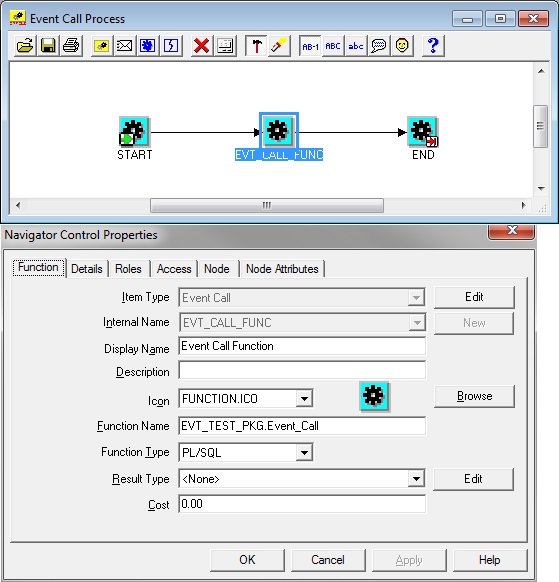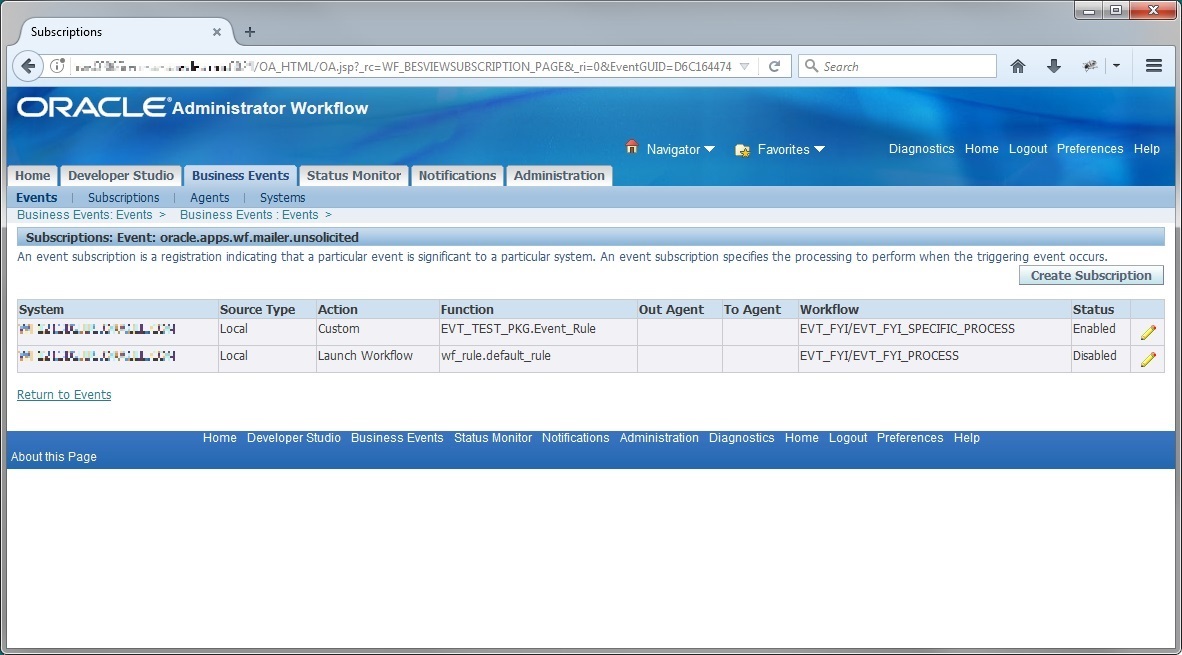Overview
Previous blog post Interaction Between Workflow Engine and Business Event System – Part 1 described declarative methods using Workflow Standard activities for interaction between Workflow Engine and Business Event System. These are the simplest methods but they are not the only methods. Interaction between the Workflow Engine and Business Event System is also possible using API calls within function activity or subscription rule function implementations.
Workflow Engine Calling Business Event System APIs
There are public APIs available in WF_EVENT package, the most straightforward of which is the WF_EVENT.Raise() API that simply raises a specific event. The figure below shows a workflow process that raises an event using the WF_EVENT.Raise API called within a function activity. This EVT_TEST_PKG.Event_Call() API is listed in the Sample APIs section.

This works exactly like the standard EVENT activity with Raise option. The flexibility of using an API within function activity implementation is that it may perform many other tasks before and/or after raising an event including raising other events.
Business Event System Calling Workflow Engine APIs
An event subscription could also call on APIs under the WF_ENGINE package such as WF_ENGINE.Event() to pass along the event information to a workflow process. The figure below shows such an custom event subscription.

The referenced EVT_TEST_PKG.Event_Rule() API is listed in the Sample APIs section.
Sample APIs
The APIs mentioned above are contained in a hypothetical package listed below.
create or replace package body EVT_TEST_PKG as
procedure Event_Call(itemtype in varchar2,
itemkey in varchar2,
actid in varchar2,
funcmode in varchar2,
resultout in out nocopy varchar2)
is
l_cnt number;
l_seq number;
l_parameters wf_parameter_list_t := wf_parameter_list_t();
begin
if (funcmode <> wf_engine.eng_run) then
resultout := wf_engine.eng_null;
return;
end if;
select count(*)
into l_cnt from user_sequences
where sequence_name = 'EVT_TEST_SEQ';
if (l_cnt < 1) then
execute immediate 'create sequence EVT_TEST_SEQ nocache';
end if;
execute immediate 'select EVT_TEST_SEQ.nextval from dual' into l_seq;
wf_event.raise(p_event_name => 'oracle.apps.wf.mailer.unsolicited',
p_event_key => 'unsolicited_test_' || l_seq,
p_event_data => NULL,
p_parameters => l_parameters,
p_send_date => sysdate);
resultout := wf_engine.eng_completed || ':' || wf_engine.eng_null;
exception
when others then
Wf_Core.Context('EVT_TEST_PKG', 'Event_Call',
itemtype, itemkey, to_char(actid), funcmode);
raise;
end Event_Call;
function Event_Rule(p_subscription_guid in raw,
p_event in out nocopy wf_event_t)
return varchar2
is
l_wftype varchar2(30);
l_wfname varchar2(30);
l_ikey varchar2(240);
lparamlist wf_parameter_list_t;
begin
select wf_process_type, wf_process_name
into l_wftype, l_wfname
from wf_event_subscriptions
where guid = p_subscription_guid;
lparamlist := p_event.Parameter_List;
wf_event.AddParameterToList('SUB_GUID', p_subscription_guid,lparamlist);
p_event.Parameter_List := lparamlist;
l_ikey := nvl(p_event.Correlation_ID, p_event.Event_Key);
wf_engine.Event(itemtype => l_wftype,
itemkey => l_ikey,
process_name => l_wfname,
event_message => p_event);
return 'SUCCESS';
exception
when others then
Wf_Core.Context('EVT_TEST_PKG', 'Event_Rule',
p_event.getEventName(), p_subscription_guid);
wf_event.setErrorInfo(p_event, 'ERROR');
return 'ERROR';
end Event_Rule;
end EVT_TEST_PKG;
/
show errors;
commit;
exit;
Additional Resources
For more information on the Workflow Engine, Business Event Systems, and Workflow Builder refer to below documents.